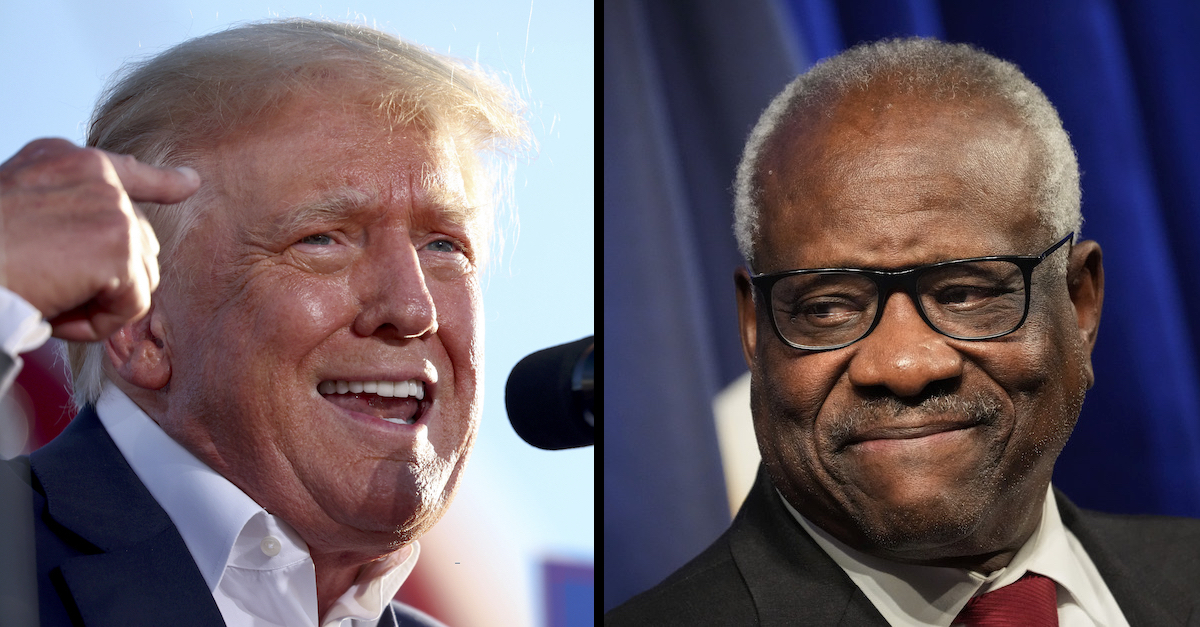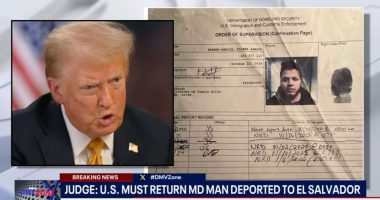
Former U.S. President Donald Trump spoke during a campaign rally on October 9, 2022. Justice Clarence Thomas was seen at a Heritage Foundation function on October 21, 2021.
A question that U.S. Supreme Court Justice Clarence Thomas asked during oral arguments in April over former President Donald Trump’s claims of immunity from his Jan. 6 prosecution was cited as some proof that the justices may “take a keen interest” in how the judge in the Mar-a-Lago case will rule on the constitutionality of special counsel Jack Smith’s appointment.
The reference to Thomas was made in a filing by a group of amici curiae (friends of the court) that U.S. District Judge Aileen Cannon has permitted to weigh in on Smith’s appointment and funding. That group includes Citizens United, former U.S. Attorney General Michael Mukasey, former U.S. Attorney General Edwin Meese, Federalist Society co-founder and Northwestern University law professor Steven Calabresi, and Boston University law professor Gary Lawson, conservatives who will argue in support of Trump’s motion to dismiss the Espionage Act case at a June 21 hearing.
The amici’s lead lawyer Gene Schaerr, the filing additionally noted, was once a clerk for Justice Antonin Scalia and Chief Justice Warren Burger.
More Law&Crime coverage: Judge Cannon sets deadline for Trump as special counsel Jack Smith insists gag order is needed to protect law enforcement, trial witnesses
Collectively, the lawyers hope to “assist” Cannon with arguments on the appointment and funding issues.
The special counsel has maintained that the amici’s arguments are “meritless” and doomed to fail as they have in “every court,” especially as seen in recent years during special counsel Robert Mueller’s Russia probe.
“Neither Trump’s challenge nor the Meese Amicus’s additional theories are novel or meritorious; to the contrary, every court that has considered them has rejected them — including authoritative decisions by the Supreme Court,” the special counsel has said.
In short, while the amici assert the special counsel is a “principal officer” whose appointment by U.S. Attorney General Merrick Garland required confirmation by the U.S. Senate, Smith pointed to court decisions that found the special counsel is an “inferior officer” who doesn’t need to be confirmed by the Senate and still answers to the attorney general.
The amici, for their part, pointed to Justice Thomas’ question about challenging Smith’s appointment as an indication that the Supreme Court will be watching how Cannon rules on the motion to dismiss.
More Law&Crime coverage: ‘Tyrant’ judge weighing Trump hush-money sentence likely to take note of former president calling him a ‘devil,’ vowing to ‘appeal this scam‘
“There is also good reason to believe the Supreme Court will take a keen interest in this Court’s resolution of the question to be addressed during the upcoming hearing on President Trump’s Motion to Dismiss,” the filing said. “During oral argument at the Supreme Court on April 25, 2024, in President Trump’s case arising there from Jack Smith’s other prosecution of President Trump, Justice Thomas asked Trump’s counsel, ‘Did you, in this litigation, challenge the appointment of special counsel?””
“Trump’s counsel responded in relevant part, ‘We have done so in the Southern District of Florida case, and we totally agree with the analysis provided by Attorney General Meese and Attorney General Mukasey,’” the motion concluded.
Have a tip we should know? [email protected]









